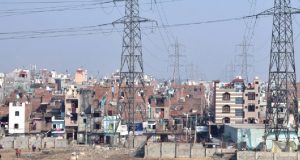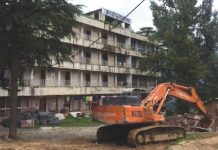 After a long wait, the residents living in Delhi’s unauthorised colonies (UCs) heave a sigh of relief as the government decides to regularise their houses. The Union Cabinet on October 23 announced to give ownership rights to 40 lakh people living in unauthorised colonies in Delhi. The colonies number around 1800. The Bill to this effect will be introduced in the next session of the parliament, the Modi-led government announced.
After a long wait, the residents living in Delhi’s unauthorised colonies (UCs) heave a sigh of relief as the government decides to regularise their houses. The Union Cabinet on October 23 announced to give ownership rights to 40 lakh people living in unauthorised colonies in Delhi. The colonies number around 1800. The Bill to this effect will be introduced in the next session of the parliament, the Modi-led government announced.
The landmark decision will bring immense relief to the residents, who have been clamouring for permanent ownership of the properties for a very long time. This initiative will address major issues being faced by the residents of UCs like lack ownership/transfer rights, provision of basic infrastructure and civic amenities. The decision will also empower the property holders of these colonies to enter into valid property transactions. Besides providing a legitimate claim to the property, the decision will encourage property holders to invest in safe structures, thereby improving the living conditions in these colonies substantially.
The decision which the government said is based on the recommendations of a committee is applicable to 1,797 identified UCs, which are inhabited by lower income group society. The statement released by the government, however, said that the decision will not apply to 69 affluent colonies identified by DDA, including Sainik Farms, Mahendru Enclave and Anant Ram Dairy. The residents will be asked to pay a nominal fee by the government after which the property rights will be conferred upon them. The charge on the colonies on Government land, for example, will be 0.5 per cent (for less than 100 sq m), one per cent (for 100 – 250 sq m) and 2.5 per cent (for greater than 250 sq m), of the circle rate of highest category of locality of the residential area surrounding the UC.
The background
Under the nodal authority of Government of National Capital Territory of Delhi, (GNCTD), the process of regularisation was to be coordinated and supervised as per the existing Regulations of 2008. To start the process, the boundary of a UC was to be delineated going by the regulations. For some unknown reasons, the GNCTD had been unable to initiate that delineation of the boundaries of these colonies even after 11 years of issuance of the regulations. The authorities had sought time until 2021 to complete this exercise.
The residents in these unauthorised colonies did not invest in safe structures and the government too did not create any social infrastructure as the said colonies were developed without approved Layout Plan (LOP). The lack of these basic amenities was the reason for the abysmal living conditions in these colonies. These colonies also could not benefit under the Master Plan Delhi-2021 under which colonies are redeveloped with 50 per cent additional Floor Area Ratio (FAR) as an incentive, because the residents did not have ownership rights. Thereafter, a committee, headed by the Lieutenant Governor of Delhi, was constituted, with approval of the Union Cabinet, to recommend the process for conferment/recognition of rights of ownership or transfer/mortgage of property and thereby create an opportunity for redevelopment of such areas in a planned manner.
The recommendations by the above committee, besides extensive consultations with the stakeholders have laid the ground for the government to go ahead with the decision of handing regularisation of these colonies. “The centre will now introduce the bill in the ensuing session of the Parliament for recognising General Power of Attorney (GPA), Will, Agreement to Sell, Purchase and possession documents, which will be a one-time relaxation for this purpose for the residents of UCs,” the statement released by the government said.
The central government in March this year had formed a 10-member committee under Delhi’s Lieutenant Governor Anil Baijal to fast track the process of regularisation of these colonies. The Housing Ministry had then claimed that since no progress had been made towards this decision, the authorities were forced to form the committee. The lack of ownership of properties in these colonies resulted in these areas not being covered under the government’s redevelopment programme, and hence the sub-standard infrastructure and amenities were a pain for residents in these colonies.
Politics over decision
The decision comes at an interesting phase as Delhi is facing assembly elections next year. The development may help the BJP to infiltrate the strong voter base of AAP in the Capital state, the political analysts say. The Delhi BJP leaders voiced their support for the decision and termed the move as being unprecedented. Delhi-based Union Health Minister Harshvardhan tweeted in support of the decision saying, “I thank PM Shri @narendramodi ji for the unprecedented decision to grant Cabinet approval to regularisation of over 1700 unauthorised colonies of Delhi. What a transformation it will bring in the lives of lakhs of our people!”
Union Information and Broadcasting Minister Prakash Javadekar at a media briefing also called the announcement as “a historic decision to give ownership rights to people in these colonies.” While the Urban Development Minister Hardeep Singh Puri also called the announcement as the “most far-sighted revolutionary decision.” Puri also targeted AAP for dragging its feet on the decision for years, saying the Delhi government even after 11 years could not take the decision and sought a time till 2021 for the implementation of the regulations issued in 2008.
Delhi CM Arvind Kejriwal too announced his happiness over the decision, on which he said his government too was endeavouring for many years. “I want to congratulate the Centre on behalf of the people of Delhi. As soon as Parliament passes the bill, the Delhi government will start registry work.… Before our government came to power these colonies were kept away from development. But in the last five years, we have spent Rs 6,000 crore to build lanes, drains, roads there for the first time and made these colonies livable,” he said in a statement. Kejriwal had already announced the proposal in July this year to give ownership rights to the citizens in these colonies. The AAP members had reportedly put posters in the East Delhi, claiming credit for the historic decision for the people struggling for ownership rights.
It is estimated that the population of the people in unauthorised colonies in Delhi is around 50 lakh, which is the 30 per cent of state’s total population. The decision to regulate 40 lakh of them may have brought cheer to the residents living in these colonies, however, there are causes of concern too. Such decisions come with shoddy implementation and procrastination, even after the decision is made. Sometimes the implementation isn’t complete, and a lot of house owners may not fulfil conditions of regularisation. Also, the work is speeded up only during the elections. All such concerns are there amongst the residents. The unauthorised colonies have come up on all types of land in Delhi, namely the government land, the agricultural land and private land.
The unauthorised colony is one which does not conform to the provisions of the master plan of the city. Although the land is legally brought by the residents, if it comes under ‘agricultural land’ then, obviously, a residential colony built there doesn’t conform to the master plan of Delhi. The masterplan lays the blueprint and the ‘plan’ of how a town should be shaped. It lays down guidelines for the infrastructure which may come up in the city. Delhi’s population has increased exponentially in the last few decades, which has also exacerbated the flourishing of such colonies. The decision is being widely welcomed as the one which will bring prosperity to millions of people.
letters@tehelka.com













